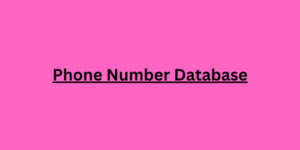Key Takeaways
Understand the unique PR needs of Phone Number Database authors, especially self-published ones.

Create a media kit that highlights your book and your brand without spending much.
Use social media to engage with your audience and share your book effectively.
Research blogs and podcasts to pitch your book and gain valuable coverage.
Network with journalists and influencers to build long-term relationships for future PR opportunities.
Understanding PR for Authors
The Importance of PR in Book Promotion
Public relations (PR) is crucial for authors looking to promote their books. Effective PR can help you reach a wider audience and gain credibility. It’s not just about selling books; it’s about building your brand and connecting with readers. Here are some key benefits of PR for authors:
Increases visibility in the market.
Helps establish authority in your genre.
Creates opportunities for networking with other authors and industry professionals.
Common PR Challenges Authors Face
Authors often encounter several challenges when trying to gain media coverage. Some of these include:
Limited budget for PR activities.
Lack of experience in pitching to media.
Difficulty in identifying the right media outlets for their book.
How PR Differs for Self-Published Authors
Self-published authors face unique PR challenges compared to traditionally published authors. They often have to take on the role of their own publicist, which can be overwhelming. Here are some differences:
Self-published authors may have fewer resources and connections.
They need to be more proactive in seeking out media opportunities.
Building a personal brand is often more critical for self-published authors to stand out in a crowded market.
PR is not just about getting your book noticed; it’s about using your book as a tool to promote yourself and your ideas. Understanding how to navigate the PR landscape can significantly impact your success as an author.
Building a Media Kit on a Budget
Author's workspace with writing tools and laptop.
Creating a media kit is essential for authors looking to promote their work effectively. A media kit is more than just a single document; it’s a collection of resources that can help you stand out to media professionals. Here’s how to build one without breaking the bank.
Essential Components of a Media Kit
A well-rounded media kit should include:
Your book cover
Author photos
A PDF of your book
A list of 5 key ideas from your book
Your book description and notable endorsements
Your author bio, website, and social media links
Optional: Book trailer, sample social media posts, pronunciation audio file, and press release
DIY Tips for Creating a Professional Media Kit
Use free design tools like Canva or Google Slides to create visually appealing documents.
Keep it concise; aim for clarity and brevity in your descriptions and ideas.
Update regularly to reflect any new achievements or changes in your book’s status.
Leveraging Free Tools for Media Kit Design
There are many free resources available to help you design your media kit:
Canva: Offers templates for media kits that are easy to customize.
Google Drive: Share your media kit easily with potential media contacts.
Dropbox: Store and share large files without hassle.
A well-prepared media kit can significantly increase your chances of getting noticed by the media. It’s your chance to showcase your work and make a lasting impression!
Utilizing Social Media for PR
Identifying the Right Platforms for Your Audience
Choosing the right social media platforms is crucial for reaching your target audience. Here are some popular platforms to consider:
Facebook: Great for community building and event promotion.
Instagram: Ideal for visual storytelling and engaging younger audiences.
Twitter: Useful for real-time updates and connecting with influencers.
Crafting Engaging Content to Boost Visibility
To make your posts stand out, focus on creating engaging content. Here are some tips:
Use eye-catching visuals to grab attention.
Share behind-the-scenes content to connect with your audience.
Post interactive content like polls or questions to encourage engagement.
Collaborating with Influencers for Greater Reach
Working with influencers can significantly expand your reach. Here’s how:
Identify influencers in your genre who align with your values.
Reach out with a personalized message explaining why you’d like to collaborate.
Offer value in return, such as free copies of your book or exclusive content.
Social media is a powerful tool for authors. Engaging with your audience can lead to increased visibility and book sales.
By utilizing these strategies, authors can effectively leverage social media to enhance their PR efforts and connect with readers.
Pitching to Blogs and Podcasts
Researching Suitable Blogs and Podcasts
Before you start reaching out, it’s important to know your audience. Look for blogs and podcasts that focus on topics related to your book. Here are some steps to help you find the right platforms:
Use Google: Search for terms that your target audience would use. For example, if your book is about cooking, search for "best cooking blogs".
Check Out Competitors: See where other authors in your genre have been featured. This can give you a list of potential outlets.
Explore Podcast Directories: Websites like Luminary can help you find podcasts that match your book’s theme.
Crafting a Compelling Pitch
When you’re ready to pitch, make sure your message stands out. Here are some tips:
Personalize Your Message: Address the blogger or podcaster by name and mention why you think your book would be a good fit for their audience.
Highlight Your Unique Angle: Explain what makes your book different and why it’s relevant to their content.
Include Previous Media Mentions: If you’ve been featured elsewhere, mention it! This can help build your credibility.
